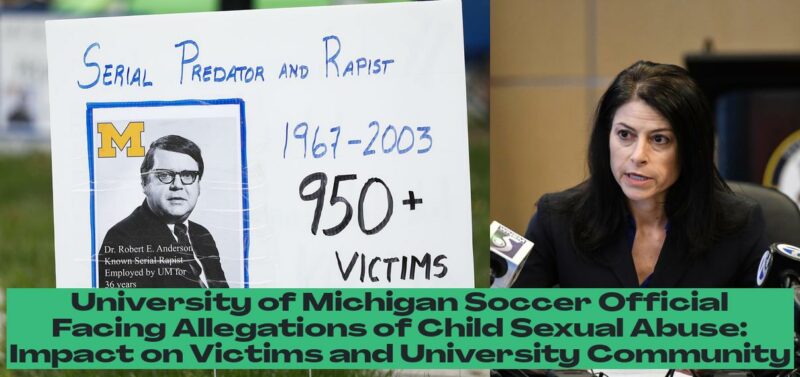University of Michigan Soccer Official Accused of Child Sex Crimes
The University of Michigan community was shaken in February 2024 when allegations of child sex crimes surfaced against one of their own, Jacob Anthony Kromberg, a 26-year-old athletic official. Kromberg, who served as the director of operations and sports scientist for the university’s women’s soccer team, was accused of soliciting sexual favors from teenage boys and possessing child pornography. The news sent shockwaves through the campus and the broader community, raising serious questions about the safety of young athletes and the responsibility of institutions to protect them.
The disturbing allegations against Kromberg came to light when a 14-year-old student-athlete reported to his coach that he had received sexually explicit messages and photos from an individual using multiple online aliases. The teen described the individual’s requests for sexual acts in exchange for money and provided screenshots of their conversations, including a partial facial image of Kromberg. This initial report triggered a swift investigation by law enforcement, leading to the identification of Kromberg as the perpetrator.
The investigation revealed a disturbing pattern of online grooming and exploitation. Kromberg, who had previously worked as a boys’ freshman soccer coach at a Washtenaw County high school, used social media platforms like Snapchat to target young male athletes. He would often attend sporting events, ostensibly to observe the games, but in reality, he was seeking opportunities to take photos of young athletes, often shirtless and unaware of his intentions. These photos were then used to further his predatory activities, as he would send them to victims, attempting to entice them into sexual encounters.
The investigation also uncovered evidence of Kromberg’s possession of child pornography, including nude photos sent to him by teenage boys on Snapchat. These images, along with the messages between Kromberg and his victims, painted a chilling picture of a predator who used his position within the athletic community to exploit vulnerable young people. The case brought into sharp focus the dangers of online grooming and the need for increased vigilance in protecting children from sexual exploitation.
The allegations against Kromberg were met with swift action by the University of Michigan. Kromberg’s profile on the school’s website was promptly removed, and he was immediately placed on administrative leave pending the outcome of the investigation. The university also issued a statement expressing its commitment to ensuring the safety and well-being of its students and athletes, emphasizing that it would cooperate fully with law enforcement in their investigation. However, the incident raised concerns about the university’s vetting processes and its ability to detect and prevent such incidents from occurring in the future.
- A University of Michigan soccer official, Jacob Anthony Kromberg, was accused of child sex crimes, including soliciting sexual favors from teenage boys and possessing child pornography.
- Kromberg, who worked as the director of operations and sports scientist for the university’s women’s soccer team, used social media platforms to target young male athletes for exploitation.
- The allegations against Kromberg highlighted the dangers of online grooming and the importance of protecting children from sexual exploitation within athletic communities.
- The investigation revealed a disturbing pattern of behavior where Kromberg would attend sporting events to take photos of young athletes, which he later used to entice them into sexual encounters.
- The case raised serious questions about the safety of young athletes and emphasized the responsibility of institutions in safeguarding individuals from predatory behavior.
The Aftermath of the Allegations
The allegations against Jacob Anthony Kromberg sent shockwaves through the University of Michigan community and beyond, prompting a wave of public scrutiny and raising crucial questions about the safety of young athletes and the responsibility of institutions to protect them.
Following the arrest and charges against Kromberg, the University of Michigan issued a series of statements, expressing its commitment to ensuring the safety and well-being of its students and athletes. The university also emphasized its cooperation with law enforcement in their investigation and initiated a review of its policies and procedures for hiring and supervising staff, including background checks and training on sexual harassment and abuse prevention.
However, the case also sparked criticism of the university’s handling of the allegations and its response to the concerns raised by the incident. Some critics argued that the university should have taken more proactive measures to address the situation, including immediately suspending Kromberg from his position and conducting a more thorough investigation into his behavior. Others expressed concerns about the lack of transparency in the university’s communications with the public, particularly in relation to the specifics of the investigation and the steps being taken to prevent similar incidents from occurring in the future.
The case also highlighted the broader challenges facing institutions of higher education in addressing issues of sexual misconduct and exploitation. Universities are often grappling with balancing the rights of individuals accused of misconduct with the need to protect the safety of their students and staff. The complexities of these issues, coupled with the increasing awareness of sexual assault and harassment on campuses, have created a challenging environment for universities to navigate.
The aftermath of the allegations against Kromberg serves as a stark reminder of the importance of vigilance and proactive measures in ensuring the safety of young athletes and preventing sexual exploitation. It underscores the need for institutions to foster a culture of transparency, accountability, and open communication, while also investing in robust policies and procedures to address sexual misconduct and ensure the safety of all members of their communities.
The Impact on the Victims and the University Community
The allegations against Jacob Anthony Kromberg had a profound impact on the victims, the University of Michigan community, and the broader athletic community. For the young athletes targeted by Kromberg, the experience was deeply traumatic, leaving them feeling violated and betrayed. The emotional toll of the abuse, coupled with the fear and uncertainty surrounding the investigation, could have lasting consequences on their mental health and well-being. The case also brought to light the vulnerability of young athletes, who may be particularly susceptible to grooming and exploitation due to their status within the athletic community.
For the University of Michigan, the allegations sparked a crisis of trust and confidence. The reputation of the university and its athletic programs was tarnished, raising questions about the institution’s commitment to safety and its ability to protect its students and athletes. The case also led to increased scrutiny of the university’s hiring and supervision practices, as well as its response to allegations of sexual misconduct. The university faced the challenge of restoring public trust and ensuring that its community felt safe and protected.
The impact of the allegations extended beyond the University of Michigan, raising broader concerns about the safety of young athletes and the need for increased vigilance in preventing sexual exploitation within the athletic community. The case highlighted the importance of awareness, education, and proactive measures to address these issues, including mandatory training for coaches and staff on sexual harassment and abuse prevention, as well as robust reporting mechanisms for victims to come forward and seek support.
The allegations against Jacob Anthony Kromberg served as a stark reminder of the importance of protecting vulnerable young people and the need to foster a culture of safety and accountability within athletic organizations. The case also underscored the crucial role that institutions play in safeguarding their communities and ensuring that victims have the resources and support they need to heal and recover.









